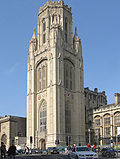 Epigram's front cover, December 2022 | |
| Type | Monthly student newspaper |
|---|---|
| Format | Compact (Tabloid) |
| Owner(s) | Independent |
| Editor | Julia Mullins and James Lewis 2025/26 |
| Founded | 1988 |
| Headquarters | University of Bristol Students' Union |
| Website | epigram.org.uk |
Epigram is an independent student newspaper of the University of Bristol. [1] It was established in 1988 by James Landale, now a senior BBC journalist, who studied politics at Bristol. [2] Former editor of The Daily Telegraph, William Lewis, was a writer for Epigram in its early years. [3]
Contents
Epigram is produced monthly during term time, and as of November 2022 the newspaper has reached 366 editions. It is available as a paper edition distributed freely around the university, with articles and discussion also appearing online. The website has now become key to Epigram's output, with tens of thousands of hits each month. The paper follows a traditional newspaper layout: the front of the newspaper is devoted to news issues, particularly those concerning students at the university.
With the addition of online editors for each of Epigram's 14 sections in order to update the paper's growing website, it now has a 70-strong editorial team mostly consisting of students from the second year and above (formal recruitment is carried out in the last term of an academic year).
All students at the university are encouraged to write for the paper, with hundreds of students contributing each year. There are opportunities to join each section at the Freshers' Fair at the beginning of the year, or by emailing the relevant section editor. [4]
